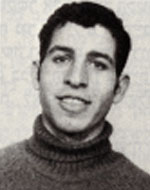Moshe, son of Esther and Jacob, was born on December 8, 1953, in Casablanca, Morocco, and immigrated to Israel with his family in 1962. Moshe’s family settled in Kiryat Shemona and got a Yaffa name. He studied in carpentry at the Kiryat Shemona Youth Center in Kiryat Shmona, and later studied carpentry at the Kiryat Shmona Youth Center and Kibbutz Shamir carpentry, finishing his studies in elementary school and later studying carpentry and working as a carpenter in the Kibbutz Shamir carpentry And a carpentry shop in Kiryat Shmona, where he was hired to help support the family and help his younger siblings with money, while he loved animals and especially loved rabbits, he enjoyed playing with cats and loved riding donkeys and horses. He naturally liked order and cleanliness and would help clean and nurture the house, even when he came for vacations from the army, he knew how to cook well and, according to his friend, Was the best cook in his army unit, Moshe was good-hearted, helped as much as possible to all those who approached him and never insulted anyone, loved his friends and was loved and accepted by everyone who knew him. Moshe was modest, modest and shy, yet he was cheerful and loved to laugh, and he told jokes and tricks, to amuse his friends, he was excellent in organizing, optimistic, ambitious and full of plans. And his brother, and especially devoted to his sick mother and much help her. He was preparing to marry his girlfriend from Migdal Ha’Emek after he was released from regular service. Prior to his induction, he worked for a contractor in Kiryat Shmona in building security rooms. Moshe was drafted into the IDF at the beginning of November 1971 and was assigned to the infantry brigade of the Golani Brigade, after which he was sent to the First Pioneers Battalion and served as a cauliflower in various areas: the Suez Canal, the Golan Heights, and Gaza. Moshe, in his attitude toward the Arab children, was playing with them and distributing bread and other foodstuffs to them, contrary to the instructions in this matter. He was known as the best machine gunner in his department and always gave him important positions in the company’s exercises, He was also very quick at changing the cartridges, and Moshe had a good physical fitness and was carrying stretchers for many hours without complaining, until they offered him to change places, because he was proud of the IDF and believed in his strength. During the Yom Kippur War, Moshe participated with his battalion in the battles in the Golan Heights. After seven days of fighting, he was wounded in the leg and sent for medical treatment, but rushed back to his unit and returned to the Golan Heights that night. Throughout the war, he made a lot of jokes and encouraged his friends. On the 22nd of Tishrei 5740 (22.10.1973), Moshe was among the first to attack the Hermon, and he was close to the platoon commander, who wanted to reach Mount Hermon and raise the flag of the State, Despite the hardships of climbing the mountain, he did not complain, and among the snipers against the Syrian soldiers, many of whose comrades were killed, Moshe was left with only one friend next to him, and he was killed in a bullet in the neck and killed. After his death, he was promoted to the rank of corporal, and in a letter of condolence to the bereaved family, the unit commander wrote: “Your son fought as someone who knows what he is for Courageous, devoted, and sacrificed. “His family donated a Torah scroll to a synagogue in Kiryat Shemona, and his family published a pamphlet in his memory,The members of the family and the words of his teacher and his comrades in arms; The Golani Brigade published a pamphlet entitled “No Words Speak of Death”, in memory of its fallen soldiers in the Yom Kippur War, and in the booklet also notes about Moshe’s character; Bank Hapoalim published a pamphlet called “Nizkor” in memory of its employees and their families, who fell in the war and a notebook about Moshe, “the soldier who wanted to hoist the flag on the Hermon”
